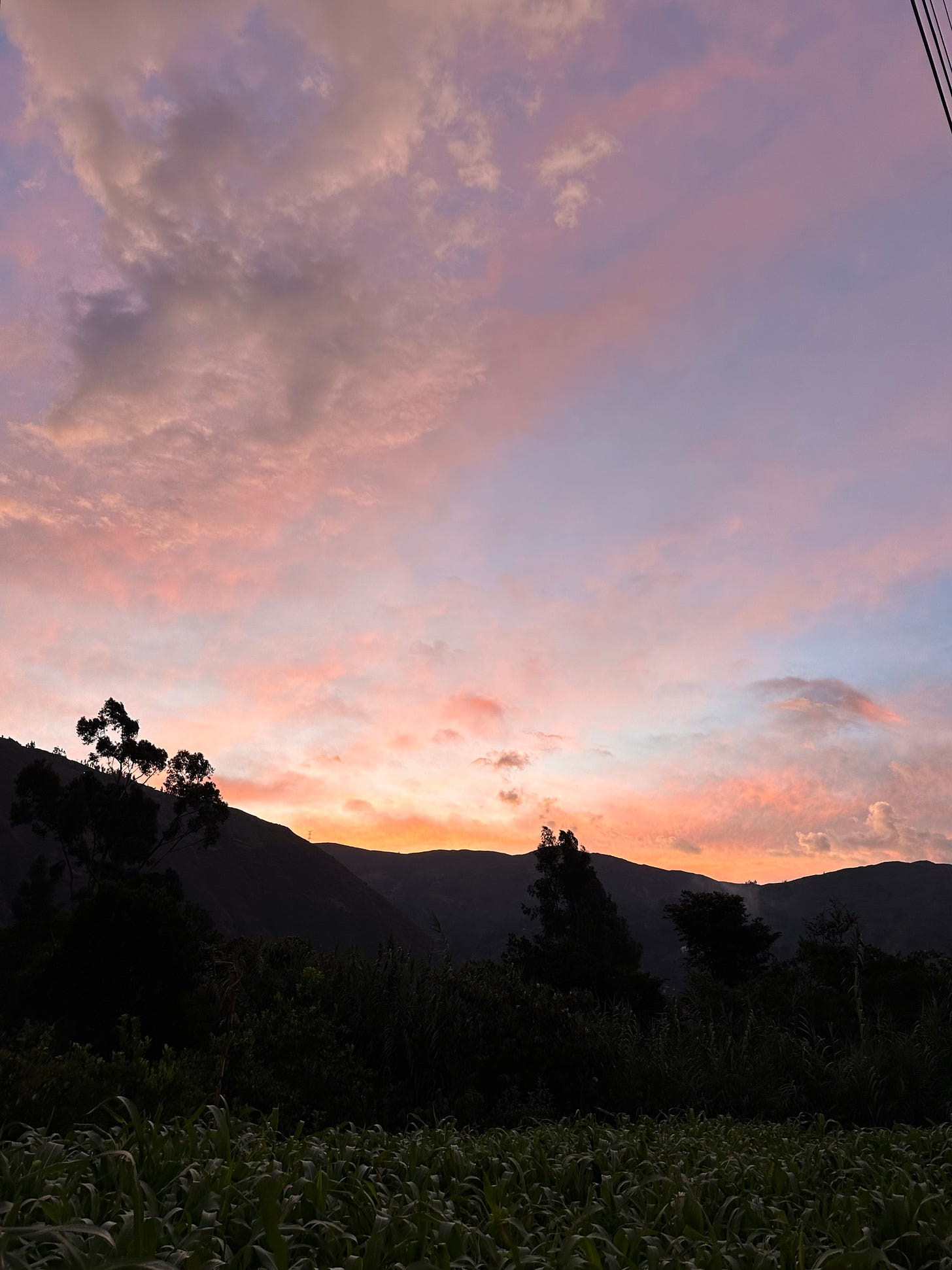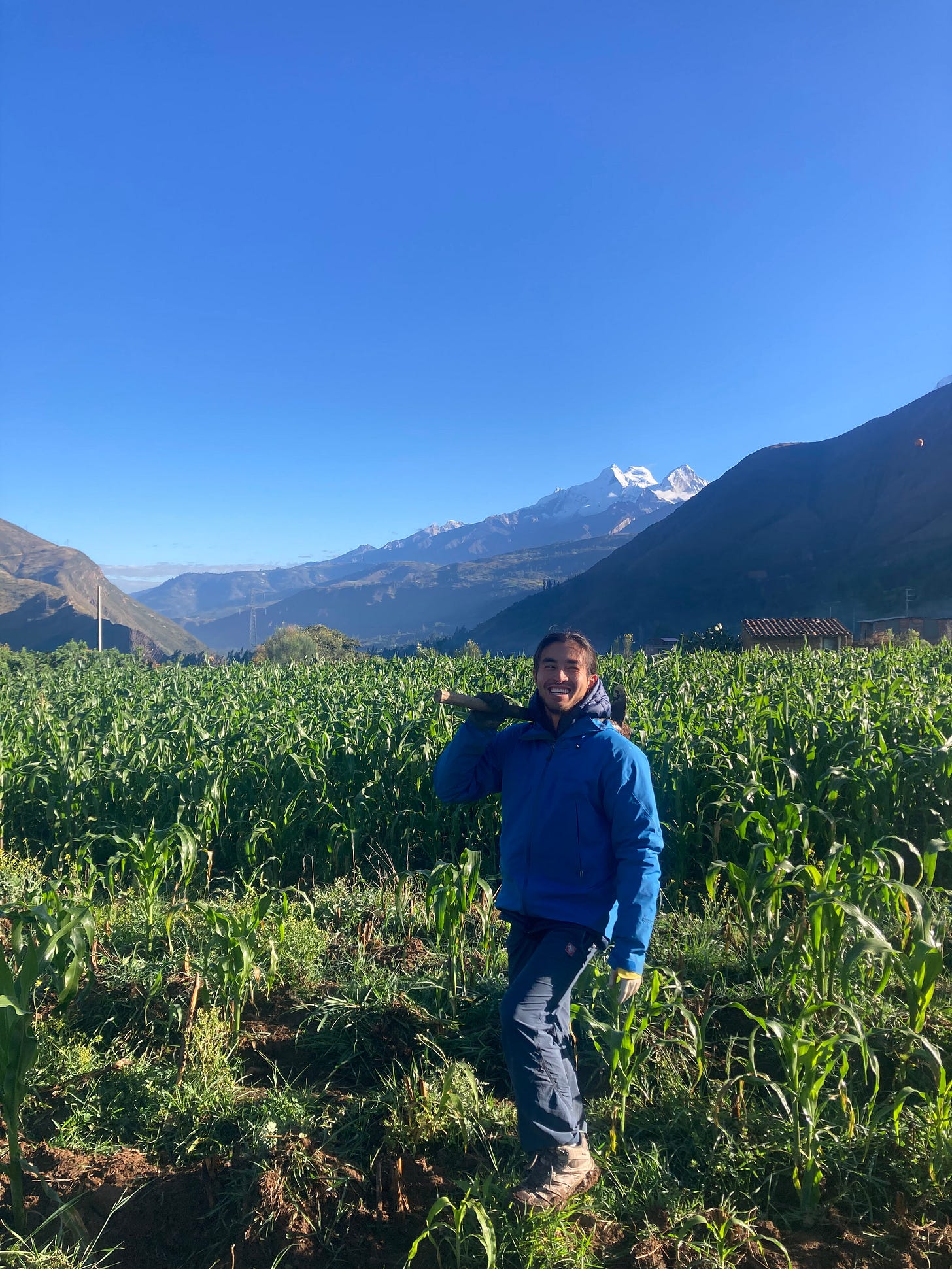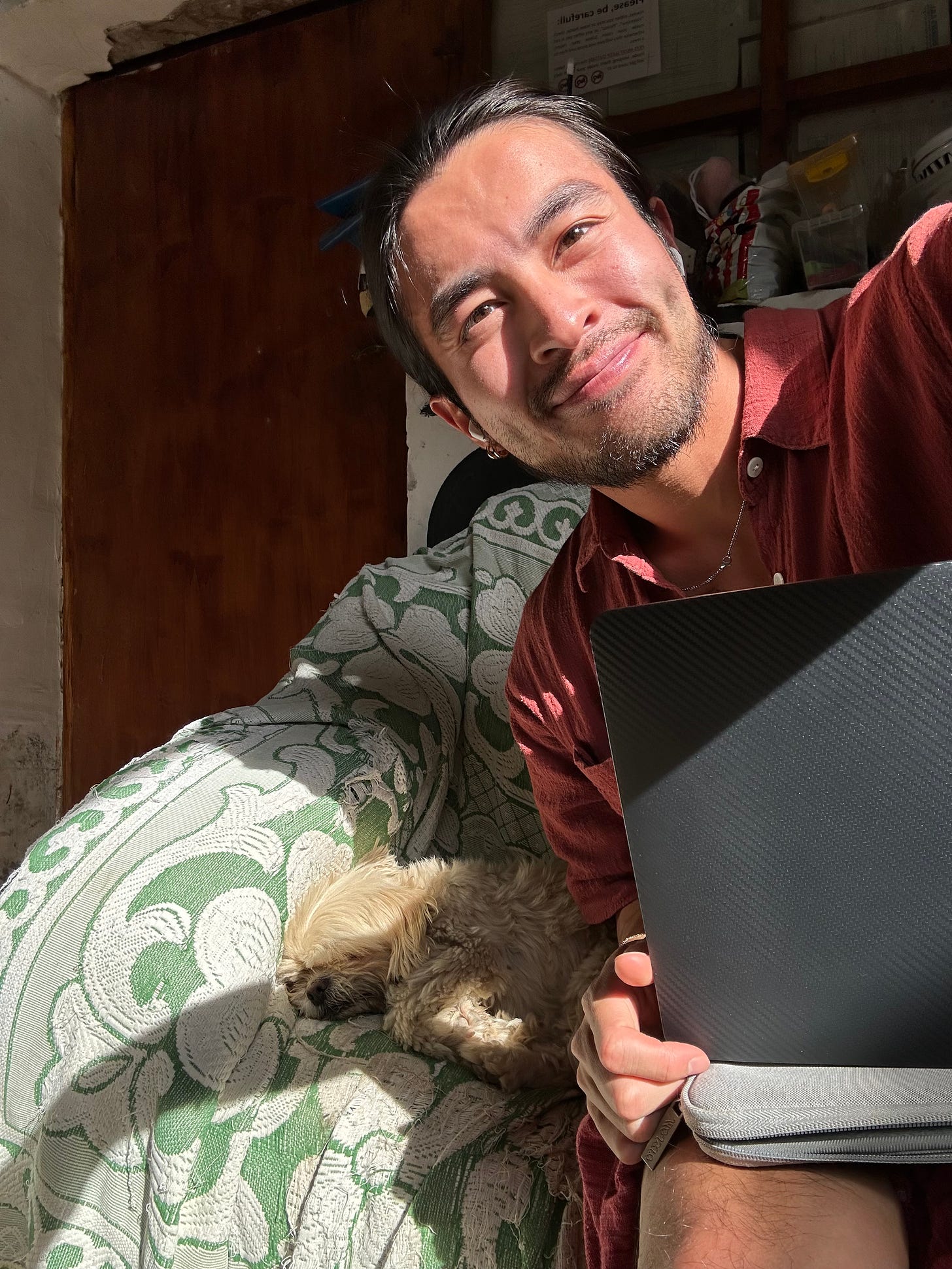somewhere on that tree, i know, a branch leads to these same mountains in northern peru, two hundred years into the past, when my people first arrived on the broken shores of this fiery land.
5:00am, tinco, northern peru.
i feel the familiar catch of breath as i sit up in bed, covers gathered around my chest. even after three weeks, the altitude still works its strange effects on me.
altitude: it is a hand hidden behind your chest, grabbing your lungs in its fist when you least expect it. i can hike a long distance just fine but lose my breath when i lean down to tie my bootlaces.
it’s still dark as we move towards the campo, a pack of wolves gathered in collective silence, each lost in our own thoughts as we rub the sleep out of our eyes. the temperature veers close to freezing at this hour, especially with the wind; every breath draws a shimmer against the darkness. beneath my windbreaker is a down jacket, hood up, my chin pressed tightly into the zip.
it’s not sunrise yet, officially. but as we walk, the slow creep of dawn begins to color the sky. a faint glow washes against the sandy beaches of brazil, climbs over the morning birdchatter of the amazon rainforest, and leaps over the towering peruvian andes before blowing a muted purple above our heads.
in that mysterious time of dawn between night and daybreak, when the stars begin to share their stories with the sun, we early risers lay witness to the whispered secrets of the universe.
i’ve never been a sunrise person, let alone a pre-sunrise person, but on mornings like this, i feel part of a nocturnal heritage that only a few can claim. like a leaf on a towering tree, a yggdrasil of sorts, i can reach my hand through the wooden grey and weave my fingers through all the twilight dawns humans have ever known. somewhere on that tree, i know, a branch leads to these same mountains in northern peru, two hundred years into the past, when my people first arrived on the broken shores of this fiery land.
time passes. the walk to the fields is only a few miles, but when you walk in darkness everything feels infinite.
e turns around and mouths to me, look. her face glows gently with a wonder that warms my heart like a loaf of freshly baked bread. a new layer of snow had fallen over the mountains overnight, covering the peaks with a silver, translucent glow; the eponymous cordillera blanca. in the waning dark, the cordilleras loom as slumbering silhouettes, giants dreaming under the weight of a violet sky.
eventually, the dirt beneath our feet turns to honeydewed grass and then the gushing tread of mud. stalks of maize stand tall, silently, judging us for interrupting their sleep.
today we will weed, plucking and grooming the soil to protect the crops from the suffocating hands of lesser grasses. i plant my feet into the ground and stretch backwards: my lower back, i know, is going to burn with the fire of a thousand suns tomorrow.
two hundred years ago the first chinese laborers arrived on the shores of this distant sea, a little-known continent south of the americas, even as their brethren were sent in droves to mine the gold rush a continent above. they came from the southern provinces of guangdong and hong kong to work the fields and raise sugar and cotton from the land; almost all of them arrived as indentured laborers, locked into exploitative contracts and as mistreated as the slavor labor they were intended to replace.1 in time, these brave arrivals escaped the chains of indentured labor and began to grow roots in this mysterious land of forest, desert, mountains and sea. they learned the local language and forgot their own.
today, lima’s barrio chino (chinatown) is thriving, and chifa restaurants – a peruvian flair of chinese food – have spread even as far as the tiny mountain town where i’m living. i cooked for my host family the other day, and was pleasantly surprised to learn that the flavors were both novel and familiar to their mouths.
it’s a strange privilege, to follow in the footsteps of my people centuries later. they came with little other option, to trade the poverty of home for another, more hopeful kind of poverty; they came out of necessity. meanwhile, i show up with a backpack, volunteering my time and labor for a taste of the farmer’s life. there’s a bit of irony in this, isn’t there?
in chinese philosophy, they say that time moves in cycles. i’ve always liked the phrase. there’s something comforting to the idea that we move in familiar patterns, weaving a spiraled glaze through the cosmos.
people often misunderstand the concept of cyclical time as something that is rigid, predetermined. but what they don’t realize is that something changes with every cycle. our feet may dance to a similar rhythm, but we do not walk the exact same steps. over time, these missteps and variations result in a completely different dance of their own.
i wonder how many cycles have passed in the two hundred years that lead me here today.
a stray dog’s bark perforates my thoughts: we’ve arrived at the fields. slowly, gingerly, as if unwilling to shake ourselves from this waning dream, we unhook the shovels from our backs and give ourselves to the earth.
🌄 what’s happening in my life:
i’ve spent the last few weeks in the andean mountains of northern peru, hiking and volunteering on a local farm in exchange for food and accommodation. the farmwork is tough, but wwoofing is something i’ve always wanted to try. so many stories to tell here – excited to share more :)
i’m an editor for write of passage this month. it’s been a beautiful (and hectic) time helping students develop their writing craft. also my first source of income since leaving my job over a year ago (woohoo).
steadily chugging along on my book. finishing up the japan chapter and entering the 2-month indonesia saga… a lot happens here, and i’m both excited and nervous to put it all to paper.
📚 what i’ve been reading:
memoirs by pablo neruda. if you’ve ever wondered how a poet writes memoir, look no further – this is some of the most poetic prose i’ve ever read.
there was a creek far down the slope, and the sound of its waters came up to me. it was my childhood saying goodbye. i grew up in this town, my poetry was born between the hill and the river, it took its voice from the rain, and like the timber, it steeped itself in the forests. and now, on the road to freedom, i was pausing for a moment near temuco and could hear the voice of the water that had taught me to sing.
🎵 what i’ve been listening to:
adriatique has been getting me through the farm days; home is their best. allllll this time…
and of course, i’ve had some latin american songs in the mix…
thank you CansaFis Foote for reading an earlier draft of this piece.

👋 if you enjoyed this post,
1. leave a like. clicking the ♥ below really does help :)
2. follow my journey on instagram. this is where i post stories, vlog updates, and photography from wherever i am in the world.
3. share this piece with a friend ❤️
this is a simplification and romanticization of the terrible conditions the chinese first faced upon arriving in peru; they endured racism, exploitation and slave-like conditions for the next 100 years. from 1849-1876, nearly half of the chinese brought to peru “died from exhaustion, suicide, or ill treatment.”
i encourage everyone to check out this link and learn a little more about the history of chinese labor in peru.








...beautiful piece brother...